ISLAMABAD: Pakistan has received $10.9 billion from international development partners out of the $30 billion total estimated loss for post-flood reconstruction work, leaving a $19.1 billion shortfall that has halted the rehabilitation of flood-affected communities in three provinces.
The updates were shared with the Policy and Strategy Committee (PSC) and the Oversight Board on Post-Flood Reconstruction Activities chaired by Federal Planning Minister Ahsan Iqbal on Monday. Country directors of the World Bank and Asian Development Bank, the UN Resident Coordinator, the UNDP Resident Representative and the Deputy Head of Mission of the EU also attended it.
The estimated loss of the 2022 floods was $30bn. The estimated financial need for recovery was projected at $16.2bn against the received pledges of $10.9bn. The Post-Disaster Needs Assessment (PDNA) estimated that the total damages exceeded $14.9bn, with economic losses reaching $15.2bn.
The assessment also projected a significant increase in food insecurity, with the number of affected people expected to rise from 7 million to 14.6m. Additionally, over 2m housing units were damaged, including 780,000 completely destroyed and more than 1.2 million partially damaged.
Extreme weather caused $30bn losses in 2022, only $10.9bn pledges received
While discussing the Integrated Flood Resilience and Adaptation Project (IFRAP), the minister expressed concerns about the delays in flood reconstruction efforts in Balochistan. He emphasised the need for accelerated progress in this province, which is among the most underdeveloped regions. The $400m IFRAP aims to assist approximately 35,100 homeowners with housing reconstruction grants to rebuild their homes according to resilience standards.
Additionally, it will provide livelihood grants to smallholder farmers to support livestock, promote climate-smart agriculture, and enhance other productive activities. The project also focuses on restoring essential services by rehabilitating damaged community infrastructure and facilities, including water supply, irrigation, roads, and other community amenities.
Mr Iqbal directed all relevant ministries to identify and resolve the gaps and obstacles hindering flood-resilient projects, stating that these must be addressed with zero tolerance for delays. He also instructed that incomplete PC-I documents should be returned within 15 days to avoid further delays.
Unprecedented disaster struck Pakistan between June and August 2022, caused by a combination of torrential rains, riverine floods, and urban flash floods. As a result, one-third of the country was submerged, affecting 33m people and displacing nearly 8m.
The floods claimed over 1,700 lives, with one-third of the victims being children. More than half of the districts in Sindh, Balochistan, and Khyber Pakhtunkhwa were declared disaster-stricken. The 2022 floods also underscored Pakistan’s extreme vulnerability to climate change, despite the country contributing less than 1pc of global greenhouse gas emissions in 2018, and consistently ranking among the top 10 countries most affected by climate change.
Published in Dawn, September 10th, 2024







